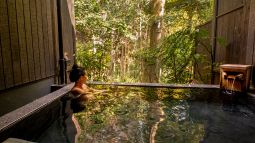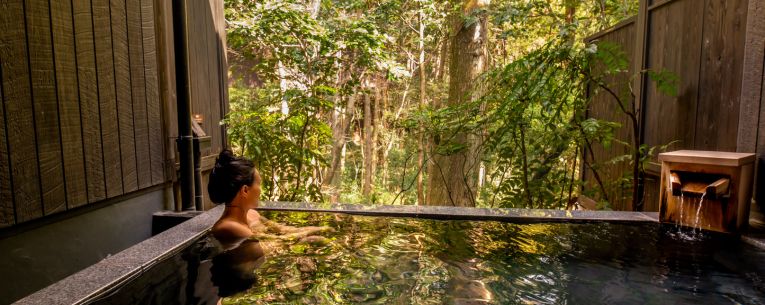Many countries have an ancient, communal-bathhouse culture that celebrates relaxation, has numerous health benefits and is welcoming to tourists. For centuries, natural hot springs and steam rooms have been centers of revitalization, spirituality and human connection.
While a soak in the tub is seen as a luxury in most of Western Europe and the Americas, relaxing bathing rituals are integral to the routines of many people living in Asian, northern European and Eastern European nations. Early Indus Valley civilization and the Roman empire, provide some of the earliest examples of these purifying retreats.
Today, long-time bathhouse, sauna and spa hotspots worldwide have become tourist draws because of their relaxing and accepting atmospheres, and surrounding natural or metropolitan areas. We’re highlighting the top spa culture destinations in Asia and Europe, and how to enjoy spa spots like the locals.
The Japanese Onsen
Lively volcanic activity fuels the natural hot springs, used for healing and relaxing soaks in pools called onsen. The spring waters are full of naturally regenerative, detoxifying minerals that may clear skin and improve blood circulation while you relax. When Buddhism spread to Japan in the 500s, soaking in thermal baths began as a spiritual and purifying practice.
Today, you can plan a trip to a traditional onsen ryokan, or hot spring inn, which offers lodging, regional cuisine and access to open air and indoor onsen. Known for hospitality, and old world architecture, ryokans are a major vacation highlight in Japan. Traditional resort towns also surround onsen systems.
Must visit Onsens:
Kurokawa Onsen, Kumamoto
On the Southwestern island of Kyushu, is Kurokawa, one of Japan’s most naturally beautiful hot spring towns. A river courses through the town, which is filled with tree-lined lanes and traditional wooden buildings and earth walls. Shops, ryokans and public bathhouses abound. Purchase a Tegata pass to explore the town’s roughly 30 public baths.
Ginzan Onsen, Yamagata
Ginzan Onsen, or the “Silver Mountain Hot Spring” town, is tucked away in the mountains of Yamagata Prefecture. Winter is the best time to visit the region, known for its ski fields, onsen and cheery winter light displays. Ryokans crafted from white plaster and exposed wood give the town a picturesque atmosphere.
Don a traditional Yukata and head to Ginzan’s pedestrian only town center, where you can rest your bones in two public baths and a foot bath. Here, you can experience an open-air hot spring pool in a brisk, winter wonderland. During the day, the town’s ryokan open their onsen to non-lodging guests.
Onsen etiquette and tips
- Feel free to enjoy onsen year round, even in the summer. While onsens are warm, the point is to take advantage of the water’s healing properties.
- Fully cleanse your body with soap and water in the showers provided before entering the onsen. The point of the onsen isn’t cleansing dirt, it’s to relax.
- Enter the water nude, though towels are used for walking between the changing rooms and the pool. But be sure to not let your towel touch the bath water. Most of the time, onsen are separated by sex.
The Korean Jimjilbang
An abundance of natural hot springs may have also jump started Korean bathing culture. In the 15th Century, kiln-heated rooms known as hanjeung were used by priests to heal the sick. Today, visiting a Korean spa, or jimjilbang is a communal experience rooted in tradition and enhanced by modern beauty practices.
Many jimjilbangs are open 24-hours and also offer lodging. Known for luxury, jimjilbangs feature saunas, steam rooms and hot tubs. Jade is sometimes used in saunas to relieve joint pain. Milk and water are applied to moisturize the skin.
Spa Land Centum City, Busan
Featuring 13 floors and 18 themed spas fueled by two underground hot spring pools, Spa Land is one of the most impressive spa facilities worldwide. Head to Spa Land’s outdoor rock pool where you can soak under a waterfall sourced by a calcium bicarbonate hotspring, said to rejuvenate skin. Lay poolside while a professional scrubber applies a lofa beauty treatment.
While most Jimjilbang are frequented by families with kids in tow, Spa Land has a policy of not allowing patrons under the age of 13, which is said to contribute to its tranquil, upscale atmosphere.
Myeong-dong Spa, Seoul
Located in the busy Myeong-dong retail district, Myeong-dong Spa is the perfect place to set down your shopping bags. Soak your weary dogs in the spa’s foot pool or immerse yourself in the whirlpool. Book a designer room to experience an array of spa and beauty treatments including stone therapy, scrubs and massages.
Jimjilbang etiquette
- Wet areas of Jimjilbang are segregated by gender. In dry and communal areas, wear the pajamas given to you at reception. Patrons are nude in wet areas.
- When first entering a wet area, scrub yourself or ask an ahjumma to do it for you. After a thorough scrub, enjoy hot and cold soaks. Eat or partake in other recreation before settling your bill.
The Turkish Hammam
Known for intricate tile work and large domes that let in soft, filtered light, traditional Turkish hammams are architectural gems. Hammams contain three areas: a steam room where bathers lounge while attendants cleanse and exfoliate their skin and give massages, a warm room for bathing and a cool room for lounging. The Hammam has roots in Roman and Byzantine bathing traditions and was popularized in 600 AD. Historically, bathing rituals in hammams were also part of weddings and births.
Must visit hammams
Cagaloglu Hamami, Istanbul
The opulent, marble bath house Cagaloglu Hamami has operated continuously since it opened in 1741. Unlike other well-known bathhouses in Istanbul, Cagaloglu maintains its original state dating to Ottoman times. Enjoy traditional spa treatments, the most luxurious of which features a massage by two attendants.
Suleymaniye Hammam, Istanbul
Built in 1557, Suleymaniye is one of the oldest hammams in Istanbul. It is the only bathhouse in the city with mixed-sex bathing and massage rooms, making it a destination for couples and families. Bikinis, trousers and towels are issued on entry. Enjoy rest in a steam room before an attendant washes, exfoliates and massages your body.
Hammam etiquette
- Cover your body with a traditional towel called a peshtemal, or wear a bikini or similar covering. If you don’t have one you can purchase one on-site.
- Shower before entering a bath
- Tie up or cover long hair
The Finnish Sauna
Saunas are integral to Finnish culture. Most Finns “take a sauna” at least once a week. The practice is so much part of Finnish life, that the Finnish Sauna has been added to UNESCO’s Representative List of the Intangible Cultural Heritage of Humanity. “The sauna tradition is in good company on the list with, for example, Indian yoga, Beijing Opera, Argentinian tango, Turkish coffee ceremony and Iranian rug making,” according to the United Nations Regional Information Centre.
Though known internationally, the word sauna is Finnish and translates to a hot steam bath. Steam is formed by pouring water over hot stones. The traditional Finnish sauna, which is a smoke sauna, is heated by a wood stove with no chimney, and dates to at least the 12th century. Many Finns end a sauna session by laying in snow or immersing their bodies into a hole in a frozen over lake. Going from hot to cold is believed to improve blood circulation.
Must visit Saunas
Rajaportin Sauna, Tampere
The oldest public sauna still active in Finland is the Rajaportin Sauna, a smoke sauna dating to 1906. After taking a relaxing sauna, dress and head over to the charming cafe across the yard for some lunch or coffee and dessert.
Allas Sauna, Helsinki
The urban and modern Allas Sauna in Finland’s capital features saunas and waterfront pools offering marvelous sea views. The facility’s architecture is impressive, modern and functional. Sunbathe on the Allas Sauna observation deck while listening to live music, swim laps or simply unwind in a steamy sauna.
No matter where you roam for your next relaxing spa day, purchasing travel insurance is a good idea to protect your travel investment and health.
Allianz Global Assistance offers travel insurance benefits such as trip cancellation which can reimburse certain non-refundable expenses if your trip is canceled or delayed for a covered reason.
You should also know that most domestic health insurance policies won’t fully cover you abroad. Emergency medical benefits included in certain Allianz Travel Insurance plans can help in the event of covered medical emergencies and emergency transportation.
Get a quote today to see how we can help you travel with peace of mind.
Related Articles









Share this Page